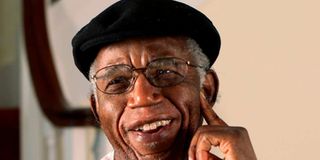Why we must learn to accept literature written in English

The late Chinua Achebe, author of Things Fall Apart.
What you need to know:
- Shortly after independence, most African countries, having come off the yoke of colonialism, were itching to Africanise their institutions.
- Whether we hate or love the English language, we will stick with it for long. This is because in our education system, English is the medium of instruction.
The issue of writing in African languages has been a subject of discourse for many years among African scholars.
Though the tempo has gradually gone down over the years, the subject still remains a controversial one, with divergent views being expressed.
Shortly after independence, most African countries, having come off the yoke of colonialism, were itching to Africanise their institutions. Names of streets, monuments and buildings were changed to reflect an African identity.
This form of rebellion against the so-called colonial oppressor was also witnessed in literature.
During that moment of reawakening, literature series such as African Writers Series emerged. Most of these works largely talked about the ills of colonialism and the way forward for the fledgling African democracies.
But the catch 22 is this: Despite the literature being put in an African context, the language was still “English.”
Literary scholars such as Ngugi wa Thiong'o and Chinua Achebe burnt the midnight oil to write African literature.
Chinua Achebe has probably illustrated the safest and innocuous way of writing African literature “in English” where characters speak in local tongues through an English medium.
Achebe was to admit the “unassailable position of English language in our literature.”
But Ngugi was forthright: that it was a betrayal of African values to write African literature in a foreign language. To Ngugi, African literature had to be written in African languages.
Though seemingly realistic, Ngugi’s position stirred a lot of debate, with writers such as Prof Ali Mazrui and Prof Wole Soyinka having divergent opinions.
Abandoned English name
Ngugi, who began his illustrious literary career under the name “James Ngugi” which appeared in his first, and probably the best three novels, The River Between, Weep Not Child and A Grain of Wheat, was later to abandon his English name to become Ngugi wa Thiong’o.
Even though he penned Petals of Blood in English, a re-branded Ngugi had his play The black Hermit translated to Kiswahili as Mtawa Mweusi, while at the same time he penned Ngaahika Ndeenda (I will Marry when I Want) and Caitani Mutharabaini (Devil on the Cross).
However, his radical approach to issues of language remain subject for debate. For instance, when he talks of “the universal language of struggle” and assuming that he meant struggle of peasants and workers, which is this “universal” language, in a Kenyan context?
True, that language could have easily passed as Gikuyu for the peasants and workers of Kamiriithu. But in a “universal” context as he puts it, this may fall off the record, even in Kenyan context, as we have Luo, Kamba, Mijikenda or even Somali peasants and workers who need to partake of this “universal” language of struggle.
This is a clear pointer of the difficult road that African writers wishing to write in native tongues have to walk.
In fact, I may belabour the point that whether we hate or love the English language, we will stick with it for long. This is because in our education system, English is the medium of instruction. In fact for us journalists, English is not just a language, it is a tool of trade.
So inasmuch as we value and feel proud of our African languages, foreign languages such as English, as long as they remain the media of instructions in our institutions and workplaces, will be with us for many years to come.





